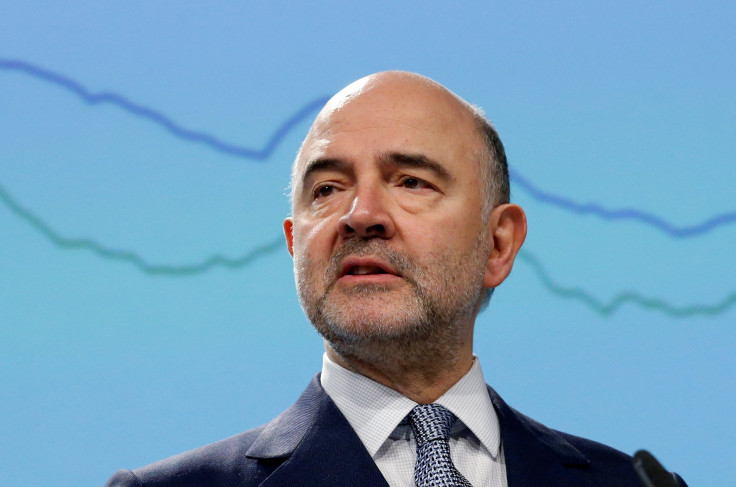Will The Euro Fall? Donald Trump, Elections, Brexit Threaten Survival Of European Union Economy

President Donald Trump's unpredictable foreign relations, the impending departure of the U.K. from the European Union and major elections in Germany and France have contributed to a sharp decline in growth for the euro zone economy, the European Commission said Monday.
“Large uncertainties characterize the economic outlook globally and in the euro area,” Marco Buti, the head of the Brussel-based commission’s economic and financial affairs department, said in a statement, reported by Reuters.
The European Commission, which acts as the executive body of the E.U., released its first economic forecasts since Trump's electoral victory in November and the official start of the U.K.'s Brexit process, predicting a .1 percent drop in overall E.U. growth from 2016's 1.7 percent to 1.6 percent this year before picking up again to 1.8 percent in 2018. Germany was expected to fall from 1.9 percent to 1.6 percent, while France, also facing national elections, was predicted to rise from 1.2 percent to 1.4 percent, according to the report.
Italy would remain at .9 percent, while Spain fell from 3.2 percent to 2.3 percent. The hardest hit, however, would be the U.K., which had already fallen from 2 percent in 2016 to 1.5 percent in 2017. The country's post-Brexit forecast for 2018 was only 1.2 percent. While the nation's exit from the E.U. as well as Germany and France's elections were thought to have a real impact on the region's economy, European Economics Commissioner Pierre Moscovici said Trump's policies may have the biggest influence.
“The British vote in favor of leaving the European Union and a certain discontent on the part of some of our fellow citizens against globalization, this led to electoral choices, which will certainly have consequences for our economy,” European Economics Commissioner Pierre Moscovici, told reporters in Brussels, according to Bloomberg News. “Clearly the U.S. represents the single most important source of uncertainty.”
Trump has defied Washington's traditional approach to foreign politics, particularly in Europe, where he has criticized allies such as German Chancellor Angela Merkel and French President Francois Hollande for what he perceived was a soft stance on Islamic radicalism. Trump has also aligned himself with U.K. Prime Minister Theresa May and hailed Brexit as the right choice for the country. Russian President Vladimir Putin, a political adversary of the E.U., has been a regular recipient of Trump's praises.
European Council President Donald Tusk has been a vocal critic of Trump and, last month, labeled the U.S. leader's "worrying declarations" as one of the most potent threats to the E.U.'s survival. Trump's rhetoric shared the list of existential threats along with Russia, China and both foreign and domestic extremists including the Islamic State Group, also known as ISIS, and rising far-right nationalism. Tusk went on to say that the E.U. was facing its worst crisis since the 1957 signing of the Rome Treaty, which established the E.U.'s predecessor, the European Economic Community.
The E.U. was founded in 1993 with the idea of establishing a single currency market and opening trade between European countries. The union's official currency, the euro, has been adopted by 19 of its 28 member states, however, recent political and economic developments have threatened the currency's future as well as the union as a whole. Last month, French presidential candidate Emmanuel Macron told a crowd in Berlin that the current euro regime too strongly favored Germany and, if serious reforms weren't adopted, that the currency would be dropped within a decade.
© Copyright IBTimes 2024. All rights reserved.












